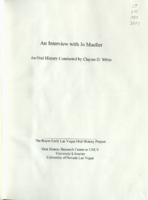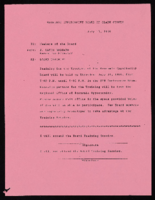Search the Special Collections and Archives Portal
Search Results

Sylvia Alvarado interview, April 12, 2019: transcript
Date
Archival Collection
Description
Interviewed by Rodrigo Vazquez, Monserrath Hernández, and Barbara Tabach. Sylvia Alvarado talks about growing up in North Las Vegas and her Catholic upbringing in a Mexican household. Her studies in Journalism & Media Studies led her to her career as a radio host on English and Spanish-speaking programs. She also talks about speaking "pocha" Spanish and the Latinx influence in radio programming.
Text

Transcript of interview with Isabella Jessie Curtis by Andrew B. Levy, February 15, 1979
Date
Archival Collection
Description
On February 15, 1979, Andrew Levy interviewed Isabella Jessie Curtis (born 1922 in Monroe, Wisconsin) about her experiences in Southern Nevada. Curtis first talks about her career in waitressing at several restaurants and casinos in Las Vegas before describing some of the early businesses in the Downtown Las Vegas area. The interview then moves to discussions on Curtis’s involvement in politics, her early recreational activities, and the atomic testing. The two later discuss the first telephones in Las Vegas, the Helldorado celebration, and her work at the Tropicana Las Vegas. The interview concludes with Curtis’s description on living in Sandy Valley, Nevada, and some of her first memories of the Union Pacific train depot in Las Vegas.
Text

Transcript of interview with Jo Mueller by Claytee White, August 26, 2011
Date
Archival Collection
Description
Jo Ann and Hal Mueller arrived in Las Vegas in 1956 when he accepted a meteorologist position. In addition to raising their two children, Jo was active in PTA, worked for Weight Watchers, and was a volunteer with League of Women voters. She tells the story of meeting Hal and their whirlwind romance to the altar, moving to the Caroline Islands and eventually choosing Las Vegas over Seattle as their next career assignment. Las Vegas became their permanent home and Jo reflects on life and experiences here.
Text

Transcript of interview with Lori Chenin-Frankl by Barbara Tabach, June 7, 2016
Date
Archival Collection
Description
Lori provides a wonderful narrative of her Judaism, her love of teaching children and her devotion to family and music. She talks about growing up in Las Vegas and becoming a bat mitzvah, a rarity for girls in 1973. Throughout her life, including the period where she moved around with her Air Force husband, she sought Jewish connections to help her feel at home no matter where she was.
Text

Transcript of interview with Joseph Thiriot by Claytee White, August 10, 2000
Date
Archival Collection
Description
Joseph Thiriot is a longtime Las Vegas resident who served the community as an educator. He was born in 1906 in Provo, Utah; one of five sons bom to George W. and Elvira Thiriot. He has vivid memories of moving about, including living in Idaho where his father sold a typing machine , a forerunner to the typewriter. Eventually the family moved to a ranch in Pahranagat Valley, Nevada, where the limits of educational opportunities compelled his paients to send him back to Provo to finish his education while living with family there. Gaining a teaching certificate enabled Joseph to teach in rural Nevada. He completed his degree at the University of Utah and after meeting Las Vegas Superintendent Maude Frazier he relocated to Las Vegas to become a teacher. He reminisces about his life and the changes that have occurred over the years in Las Vegas.
Text

Transcript of interview with Judy Lee (Johnson) Jones by Claytee D. White, February 22, 2007
Date
Archival Collection
Description
In the 1950s and 1960s, the Copa Room at the Sands Hotel and Casino featured glamorous showgirls. For a few years, the Houston Chronicle sponsored a contest that added the Texas Copa Girls to the line. In 1958, one of the winners was 17-year-old Judith Lee Johnson. For the "wild" but "naive" Judy, the experience was a period of funfilled freedom, followed by relentless encouragement of others to attend college, which she reluctantly did. To her surprise, she embraced the college life, took her studies seriously, and received an education degree. She also became Miss Houston. Four years later she returned to Las Vegas and the Sands. As she stepped into her role as a showgirl this second time, she was no longer the newbie. She experiences the lifestyle with more maturity. She talks about the celebrities she met, the lasting friendships she formed, performing in the Elvis movie Viva Las Vegas, and her trip around the world, a trip that included her personal dream of going to Paris. Judy shares details of her family heritage and she wonders to what extent she might have been living her mother's dream. Though her love of performance and theatre is keen, Judy channeled her passions into a 29-year career as an educator. She married a Marine in 1965, raised their children, moved with his career. She and her husband, Walter F. Jones, live in Virginia.
Text

Erica Mosca oral history interview: transcript
Date
Archival Collection
Description
Oral history interview with Erica Mosca conducted by Cecilia Winchell, Stefani Evans, and Jerwin Tiu on February 3, 2023 for the Reflections: the Las Vegas Asian American and Pacific Islander Oral History Project. In this interview, Mosca reflects on her life journey from a low-income Asian American to a current serving Nevada State Assemblywoman. She recalls that most of her childhood was in Palm Springs, California where she enjoyed a diverse community of students within her education system. It was not until she moved to Navato, California where she first experienced the economic and resource gap between economically diverse areas. Mosca went on to be involved in a college readiness program and received a scholarship to Boston University. After college, Mosca went on to work for Teach for America where she was stationed on the east side of Las Vegas at Goldfarb Elementary School where she grew a passion for leadership. She eventually returned to school and graduated from Harvard University, returning to Las Vegas to start her nonprofit "Leaders in Training." Mosca hopes to inspire change in her communities by enacting legislation and initiatives targeted towards the communities she was and continutes to be a part of.
Text

Lily Teo oral history interview: transcript
Date
Archival Collection
Description
Oral history interview with Lily Teo conducted by Stefani Evans on February 7, 2022 for Reflections: The Las Vegas Asian American and Pacific Islander Oral History Project. Lily Teo discusses her upbringing in Singapore, her education, her religious beliefs, and converting from Buddhism to Catholicism. She talks about her husband, her early married years, and what life was like as a young mother of three children. Teo shares how she started a catering business to feed construction workers and was responsible for shopping for ingredients, preparing all meals and tea, and cooking the food on site in her temporary kitchen. She talks about her children, the faiths they practice and languages they speak including English, Malay, and Mandarin, and the customs and traditions they practice, such as celebrating Lunar New Year and other holidays. Lily's daughter, Stella, sits in on the interview and expands on her mother's recollections.
Text

Economic Opportunity Board of Clark County (Nev.): memos, agendas, and meeting minutes
Date
Archival Collection
Description
From the Clark County Economic Opportunity Board Records -- Series I. Administrative. This folder contains memos, agendas and minutes from meetings of the Clark County Economic Opportunity Board from July 1969 through December 1969
Text

June Monroe and Kazuko Atomura oral history interview: transcripts
Date
Archival Collection
Description
Oral history interviews with June Monroe and Kazuko Atomura conducted by Cecilia Winchell and Stefani Evans on July 14 and July 19, 2022 for Reflections: the Las Vegas Asian American and Pacific Islander Oral History Project. In the first interview, Kazuko Atomura describes her childhood in Taiwan and Tokyo, Japan, and shares both happy and difficult mememories of that time. Atomura eventually moved to Los Angeles, California, where she reconnected with a man she previously met in Japan. She married him and together had their daughter, June Monroe, and another son while living in Corpus Christi, Texas. After difficult medical procedures involving Atomura's husband and Monroe's younger brother, Brian, the family relocated to Las Vegas, Nevada. Monroe recalls attending Las Vegas High School and Bonanza High School, and the struggle of making new friends as a young person. In the second interview, the mother and daughter discuss racism, discrimination, and identity. Kazuko Atomura recalls her many experiences with discrimination as a result of both her appearance and language barriers. June Monroe discusses how she came to be proud of her Japanese heritage, while Atomura discusses some of the community activities she has been involved in since living in Las Vegas including the Japanese Culture Club and odori dancing. Then, both Atomura and Monroe discuss Monroe's brother, Brian, who received two kidney transplants; one from Monroe's father and one from Monroe herself. Atomura talks about the shrines she has built for Brian, the experience of him being on dialysis, care taking, and his final days. Monroe shares about her activism with organ donation, being regularly involved with the Nevada Donor Network and helping to pass significant pieces of legislation within the area of organ donation.
Text
